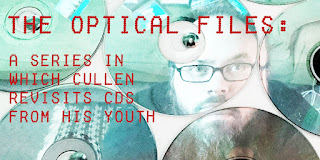My uncle Jerry was the only one in my family who heard music the way I heard it. He gave me this CD (along with With the Beatles) for my 12th birthday in 1997. I was just starting to play the drums, & he told me to practice by playing along to these songs. It would keep my playing simple, straightforward & tight, he said. It was the first time somebody had encouraged me to not just passively listen to music, but to engage with it as a participant.
(It's also why, to this day, I will tolerate no Ringo slander. To counter an apocryphal Lennon quote that I doubt he ever actually said, Ringo may not have been the best drummer in the Beatles, but he was the best drummer for the Beatles.)
A few years later, when I was a high school freshman & still didn't know much of anything, an older classmate told me he was in a punk rock band. When I asked if they played originals or covers, he looked at me like I'd asked if he wiped his ass with toilet paper or aluminum foil & scoffed "we're not a COVER band." Then he spat on the ground as if the very phrase "cover band" had left a rancid taste in his mouth. Only later did I learn that this rock & roll disdain for covers came, indirectly, from the Beatles. They created the concept of the self-contained rock band who wrote their own songs, played their own instruments, created their own arrangements, conceptualized their own artwork, etc. (The original liner notes by Tony Barrow, which my CD reproduces, say "Producer George Martin has never had any headaches over choice of songs for The Beatles," demonstrating how unusual this arrangement was for the time.) Given that, perhaps it's a bit surprising that only 8 out of 14 songs on their debut album are originals. It's even more absurd when you realize that the McCartney/Lennon-penned songs are vastly more interesting than the covers, with the possible exception of "There's a Place."
I enjoy revisiting albums I know really well but haven't played in a while. You notice little things with fresh ears, like just how impressive the nimble, twisty arrangement of "Ask Me Why" really is. Of course, Paul's bass is easy to overlook until you tune into it, then it's impossible not to hear how incredible his runs & scales are. This is apparent right from the opener, "I Saw Her Standing There." "Lead bass" indeed.
On this listen I also noticed the nice balance of rock & pop on the record. It opens & closes with a pair of ferocious rockers, plus we get "Boys," "Please Please Me" (which I always thought & continue to think is about oral sex), & "There's a Place" along the way, while the rest of the album is mellower early '60s pop. There's even a Burt Bacharach tune! Another element I noticed on this listen is how finely matched John & Paul's voices are (& George to a certain extent, though he stands out when he sings lead, especially on "Do You Want to Know a Secret"). Their vocal identities were still developing, but it seems like a conscious choice to attempt to sound like one another to make duets like "Misery" smoother. Actually, most of the time it's more like John is trying to sound like Paul rather than the two meeting in the middle. The exception, of course, is "Twist and Shout," where John sounds more like John Lennon than John Lennon. Apparently he was getting over a cold, but whatever the cause, the raging, ragged vocal performance makes me feel like I'm standing in a dingy basement club in Hamburg listening to a road-hard band's last number of the night.
I've always thought about the Beatles the same way I think about the Wu-Tang Clan: it's once-a-century astounding that they even existed. That 4 guys with THAT much talent, vision & innovation could (a) exist at the same time & place, (b) find each other, & (c) manage to cooperate enough to create multiple albums together almost beggars belief. But it happened, & Please Please Me is the seminal text from which all rivers flow.


No comments:
Post a Comment